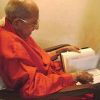ලෙස්ටර් ජෙමිස් පිරිස්
Early life
Lester James Peries was born on April 5, 1919 in Dehiwela, Colombo, British Ceylon. Lester's father Dr. James Francis Peries had studied medicine in Scotland and his mother Ann Gertrude Winifred Jayasuria was a graduate of St. Bridget's Convent in Colombo. Jayasuriya notably was the first student to pass the Senior Cambridge exam at the school. Lester had three siblings: Erica, Ivan and Noel.
The Peries family was a Roman Catholic family that had become anglicized. Growing up Lester only spoke English at home and celebrated Christian traditions like Christmas. His only link to Sinhala culture was his grandmother who didn't trust Western medicine and spoke Sinhalese. At the age of eleven Lester was given a 8mm Kodasko projector by his father as a gift, which ran Chaplin's silent movies. At that time, his only interest in films was when he and Ivan would haunt the cinema to watch foreign film serials which ran day after day. Lester was never involved in school drama productions, and had no idea he was going to be a film director especially since British Ceylon did not have its own national film industry at that time.
He attended St. Peter's College in Colombo as a teenager before dropping out to pursue a career in journalism at the age of 17. He found his first work with the Daily News writing for the blue pages which was an arts supplementation. In 1939 he joined the Times of Ceylon working under Indian editor Frank Moraes. He also reviewed books on Radio Ceylon for a short period.
Peries first real work with production came when he joined a theater group called Drama Circle. This was a group of like minded individuals which regularly produc ed modern English plays. Here Lester was engaged in all aspects of the productions other than acting.
Stay in England
In 1947 Peries traveled to England on his mother's advice to join his brother Ivan Peries who was there on an art scholarship. Moreas suggested writing a column from the country to be published in the Times which became "Letter on the Arts from England."
During that time, filmmaking was taking off in the UK with about 400 amateur film clubs around the country. In addition, Lester's passion for the cinema was developing and he met another Sri Lankan with similar interests, Hereword Jansz. The two youngsters decided to make a film together despite Hereword having his doubts about competing with established, well-funded clubs. They began with Lester writing the script and directing while Hereword did the filming with their limited camera equipment.
Their first effort `Soliloquy` (1949), a short film, won the Mini Cinema Cup for displaying the best technical proficiency. This work was followed by three other experimental films.
In 1952, the editor John Hockin told Lester of an interesting assignment he had for him - an interview with the new head of the Government Film Unit of Ceylon. At the end of the interview, the head of film unit Mr Keene inquired after Lester's o



